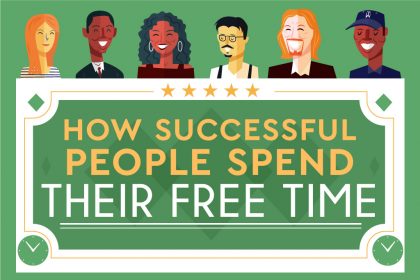Eight expert tricks to increase your productivity
Need to achieve more in your working day? Read eight tricks to increase your productivity, inspired by advice from the world’s top productivity experts.
It there’s one quote that sums up the whole topic of productivity for us, it’s this:
“Everyone gets the same 24 hours a day. It’s what you do with them that counts.”
And while, if you’re a mum, this quote isn’t entirely accurate, as those 24 hours aren’t yours alone to use (or waste), the sentiment behind it still stands. And basically that is: use your time well!
As two very busy freelance mums ourselves, we had to find more time (and use it better) when we were building Talented Ladies Club three years ago. And since those crazy early days, we’ve been on a constant hunt for secrets and tips to increase productivity.
Eight expert tricks to increase your productivity
So we were delighted to discover The Productivity Book by Michael Brecht, founder of scheduling tool Doodle. The book grills 30 experts from around the world about their day, gleaning insights into their own productivity habits. It concludes with sharing common learnings from all the experts – the core secrets of increasing productivity.
And to help you boost your own productivity, we’re sharing eight of them here with you now – plus links to learn more about how to adopt them.
1) Use technology wisely
Technology is a fantastic enabler. It allows you to stay on top of your emails and social media accounts wherever you are – on your way to a meeting, at soft play or even at the pub.
But just as technology gives, so it taketh away. As handy as those perpetual email and social media beeps can be when you need to stay in touch when you’re out and about, they can be incredibly distracting when you’re trying to concentrate. In fact, according to research it can take you as long as 23 minutes and 15 precious seconds to get back into a task once you’ve been interrupted by something as inconsequential as, say, a tweet letting you know how appreciated your follow is on Twitter.
So if you want to focus on a task, switch your mobile devices (and anything else that’s likely to interrupt you) on silent. Or better still, turn it off altogether.
If you’re working on your laptop and you’re the kind of person who’s easily distracted, force yourself to turn off any alerts on that and shut down your email and any other internet browser windows that may tempt you away from the task at hand.
Technology does have its productivity uses though. There are a ridiculous number of handy productivity apps and tools available that help you to organise your life and work more smartly. Here are a few recommended by The Productivity Book, plus one of our own personal favourites:
- Evernote
- Todoist
- Nozbe
- Wunderlist
- Asana
- focus@will
- Out of Milk
- Doodle
- IdeaFlip
2) Switch off
As tempting as it can be to cram every available second of your day with work – especially if you’re building a business you passionately care about – you’ll be much more productive if you switch off (physically and metaphorically) regularly.
Apparently, as much as 98% of our mind is unconscious, and in order to get access to this amazing wealth of potential we have to switch off the measly 2% we use for conscious thought.
And to do that, you need to just… do nothing. Or at least, not tie your mind up with by conscious thinking.
Just consider – what have you been doing when you’ve had your best ideas? Those bolt-from-the-blue Eureka! moments? Chances are you were doing something as mundane as washing up, running, driving somewhere, walking or bathing or showering. An activity that allowed your mind to just wander aimlessly, to unconsciously connect dots and process thoughts until, from the depths of your brain a brilliant idea emerged.
So if you want to be fully productive, stop trying to think, and allow the process to happen naturally by switching off from work and doing something completely different.
3) Keep healthy
Your brilliant mind doesn’t exist in isolation – it’s attached to the rest of your body, and unless that body is in good working order, it’s unlikely that your mind will be working at 100%.
So it’s not just important but essential that you ensure you eat well (you can read how to eat your way to productivity here), stay hydrated and get enough exercise – even if it’s just 15 minutes of yoga in the morning and a walk around the block at lunchtime.
Your body also needs a decent night’s sleep. And yes, while that may be difficult if your children are really young, it’s never too early or late to practise good sleep habits yourself to maximise any hours your children do let you sleep.
Exactly how much sleep you should try to get is down to your individual needs. But according to the Sleep Foundation, adults between the ages of 25 and 64 need between 7-9 hours a night. If you find sleep frustratingly elusive, or suffer from poor quality sleep, you can read eight ways to get a better night’s sleep here.
And the great thing is that, if you eat well, keep active and get a good night’s sleep every night, you won’t just be more productive, you’ll feel fantastic too!
4) Get up early
According to the experts, the best time of the day to work is early in the morning before everyone else wakes up (another good reason to get a great night’s sleep!).
In fact, pretty much every productivity expert cites starting early in the morning as one of their top productivity tips. If the thought of this horrifies you, don’t worry – you do get used to it. It also helps if you create an enjoyable (well as enjoyable as anything can be at that time of the day…) ritual around it.
I often wake up and start work early, and I love the peace and quiet. I put the radio on, make a cup of tea in my favourite mug, and work away with the cat purring next to me until I hear the rest of the house stir. And it always feels wonderfully satisfying doing the school run knowing you’re two hours ahead in your working day. (You can read 14 secrets to an amazingly productive morning routine here.)
But if mornings really aren’t your thing (and early morning working doesn’t work for everyone) you can always get ahead by burning the midnight oil instead. Just make sure you have time and space for your brain to unwind before hitting the sheets and trying to sleep.
5) Work in focus blocks
We weren’t surprised to see time blocking come up in The Productivity Book as a brilliant productivity hack. We ourselves often use focus blocks (90 minutes of focused, uninterrupted work) if we have a lot to accomplish.
One of the reasons why focus blocks work is that they reduce the amount of time you have to do your work. Remember the concept of Parkinson’s Law? The idea that work will expand or contract to fill the time allotted to it?
If you set clear parameters around your work time, you force yourself to be very clear about what you want to achieve – and what tasks will enable you to reach that goal. So you can eliminate any time-wasting tasks and focus on those that are much more productive.
Focus blocks also help to nudge you out of any procrastination habits. With a clear list of tasks to achieve and a clock ticking, you can’t afford to allow yourself to be distracted or to over-think how you will approach your work.
Find out how to work in focus blocks here and try them today – they really work!
6) Take regular breaks
It’s tempting, especially if you have a relatively small work window every day, to plough on through lunch without a break. But, rather than get more done, it’s likely that you’ll be much less productive as a result.
In fact, according to one famous productivity principle, the Pomodoro Technique, you should actually time your work and take regular breaks throughout your working day.
The generally accepted amount of time you work before taking a short break using this technique is 25 minutes. Here’s an overview of how it works:
- Decide on the task you want to get done.
- Set a timer (usually for 25 minutes).
- Work until the timer rings. If a distracting thought comes into your head, write it down and return to your work.
- When the timer rings, make a check mark on a piece of paper. If you have less than four checks, take a short break (three to four minutes) and start from the beginning again.
- If you have more than four checks, take a longer break (15-20 minutes) before starting again.
The Pomodoro Technique was created by Francesco Cirillo in the 1980s, and has been practiced by time management experts ever since. It’s based on the principle that regular breaks increase your focus and productivity, and its enduring popularity is testament to its success.
7) Make lists
A well-planned and realistic to-do list clears your mind and narrows your focus, preparing you for a productive and satisfying day of work.
Productivity experts agree that spending a few minutes every morning (or the night before) planning out your day can pay dividends later on. It makes it easier to avoid tempting time-wasters during the day, or be side tracked by tasks that seem urgent at the time, but won’t actually get you any further forward in the long run.
But like everything in life, all lists are not equal. In fact, there’s a whole science behind writing a great to-do list. Our personal favourite version of the to-do list is the Success List (you can find out how to write one here). We also love a done list – a list of everything you have accomplished in a day.
8) Say no
If you’re a people pleaser, this productivity tip might be the most frightening of the lot (even scarier than the suggestion that you start work at 5am every day!). But it’s also one of the most important and simple – just say ‘no’.
If your business is quite new, or you’re just starting out as a freelancer or in a new role, it’s easy to find yourself saying yes to every offer, request or demand. After all, you want to be seen as approachable, nice and capable. You also don’t want to disappoint the asker, or risk them never asking you again.
But taking too much on, especially if you have planned out the perfect productive day on your Success List, can throw everything off balance. You distract yourself from the tasks you were working on, and find yourself rushing your work to play catch up. As a result, you feel more stressed and may even find yourself producing work of a lesser quality, just to get everything done in time.
Being too eager to say yes also means that sometimes you’ll agree to work or favours that really aren’t your strong suit. You’ll take longer to do these tasks, you’ll hate them and the chances are that no one will be happy with the results.
The best scenario for all parties on these occasions is honesty. If you have the time, inclination and appetite for a new task or favour, then by all means say yes. But if you are asked to do something that you don’t have time for, don’t want to do or know is beyond your skill set, you’ll be doing everyone a favour if you politely turn it down.
(If you still struggle with the concept of this one, read more about why you need to say no more often, and how to do it.)
Take our productivity challenge!
Want to increase your productivity? We’ve got a challenge for you! Every week for the next eight weeks, adopt one (or more) of these productivity tips and see how it changes the way you work (and the quality and quantity of the work you produce).
If you like the productivity tip then keep it. If it doesn’t work for you – for example if you just can’t get your brain working first thing in the morning – then drop it. What have you got to lose by trying?
Download The Productivity Book for more productivity insights and tips from the experts.










